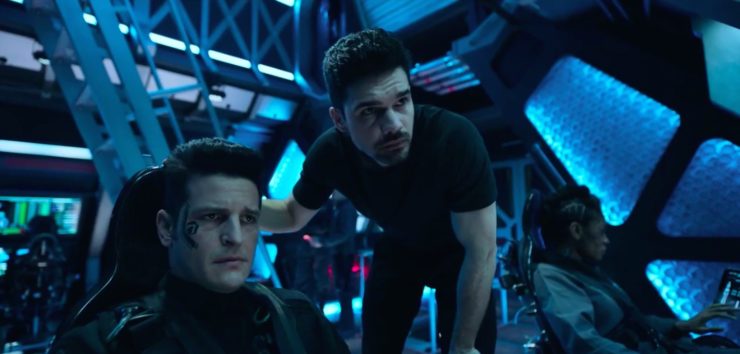Usually I love nothing more than peeling apart the layers of Expanse episodes, separating the storylines and what they have to say, thinking about what the action means for the characters, how they’re shaped by their choices, and how neatly all these things fit together. “Tribes” is beautifully structured, from a shaking Avasarala at the outset (still in that blue jacket!) to a rattled Amos realizing how much he needs his crew.
But this week, I just keep wanting to see it as a single piece: a long, affecting moment of survival, grief, and arrogance. In that sense, it feels so close that it’s hard to look at straight-on.
Spoilers for episode six, “Tribes,” follow!
One shorthand description for The Expanse is that it’s about the way humanity takes our problems with us, even into the reaches of space—though that’s always felt like both a tidy and somewhat reductive way to put it. Still, Marco constantly throws so much of that theme into sharp relief: He believes his own proclamations about a new future even as he recreates the mistakes of humanity’s past. (Not that he’s the only one.) Being right doesn’t make his actions right. He’s not enough of a visionary (despite his son’s opinion) to see a new way forward, relying instead on some of the oldest tools in the box: violence, death, fear, displays of power. The Roci‘s escape aside, he’s high on his own considerable success right now; he’s charismatic and he tends to keep close only those who will agree with him. Those that don’t believe him are light-years away. Their opinions are immaterial.
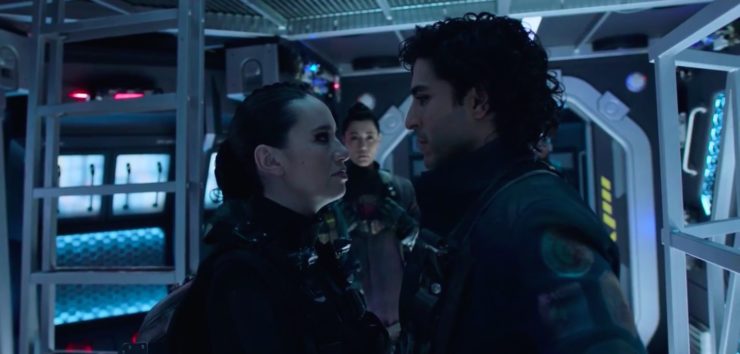
All of this is why, in an episode loaded with powerful, character-defining scenes, maybe the most important one is the flicker across Filip’s face when he realizes not everyone believes his father. When Cyn says that their argument about Naomi was hardly the first time he and Marco had gone head to head—this is incomprehensible to Filip. It’s the first crack in the foundation of his belief. Drummer delivers the next, when she says that by leaving the Behemoth, Naomi “saved every soul in the system.”
These are not the stories Filip has been told.
Buy the Book
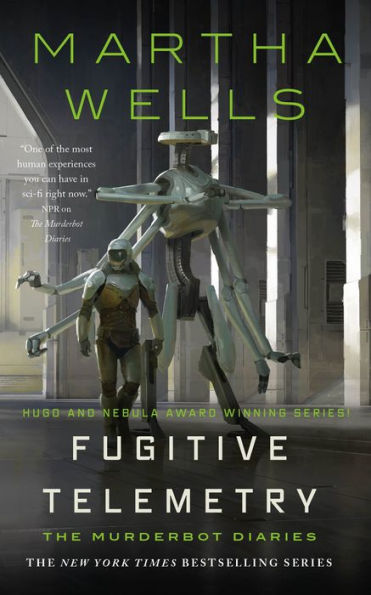

Fugitive Telemetry
And so we’re right here in my favorite theme: the way the stories we hear and the ones we tell (or omit) shape the world. Filip, intrigued by Drummer’s story, goes straight to Naomi to ask for the details. Marco, listening in, turns off the audio in disgust, because of course he does: he can’t stop that conversation from happening without making it even more clear that Naomi’s story has power. Naomi doesn’t know what inspired Filip’s question, but she knows she has to choose her words carefully. This story is a lever, if it’s told just right.
“Tribes” is built out of conversations like this, where the stories of who people are change their situations in big and small ways. Monica reminds Bull that part of her story involves being on the Rocinante when it went through the Ring, and he can’t argue with that. (I love Monica’s determination to be on that ship, where she feels safe amidst so much chaos.) The acting sec-gen tells a tiny piece of Avasarala’s story back to her—that she is the only reason they destroyed some of Marco’s rocks—and because Shohreh Aghdashloo is a brilliant and subtle actress, you can see how that acknowledgment returns something to Avasarala. It centers her back in herself, even as she grieves the likely loss of her husband, Arjun. It doesn’t fix anything, but it’s a fact: she fought and she fought and it mattered.
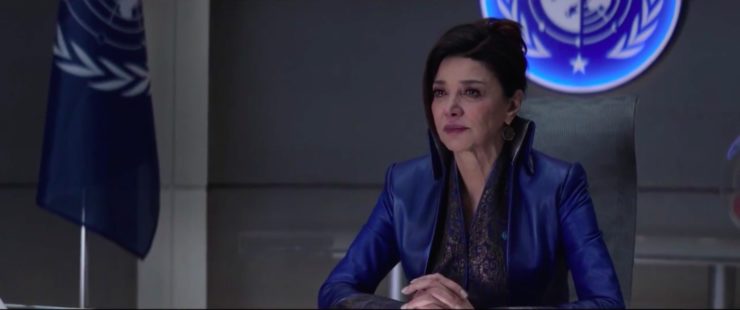
Drummer’s whole past is tangled in this episode. Last season, she made it clear that her version of a future for the Belt doesn’t involve them acting like Inners, killing to take what others have. And now she’s trapped in a position where she has to join forces with a man who does exactly that. Her grief for the two men she parted ways with, Fred and Ashford, is still fresh and raw and not very far under the surface, however well she contains it—all of that stays present and vivid as Marco needles her, and as her family realizes Marco’s offer is no choice at all. The Inners will respond to Marco’s act of aggression, and any Belters on their own are even more vulnerable than ever.
Watching Cara Gee as Drummer watches her family is a study in silence. So often, she sits calmly while the rest of them talk something through, and though her face is still, every cut back to her face is a response. Gee has such a deft handle on her character that every gesture, every economical choice of words, is embedded with a Belter’s care and precision.
“Tribes” is a story about grief, even if the people who are deep in mourning aren’t quite aware of their own losses yet, and that makes it land with extra weight. In the Belt, Holden hasn’t had a moment to process losing Fred before he’s faced with that message from Naomi that says “If something goes wrong.” Alex and Bobbie, though inventively working their way out of a shitty situation, barely know the outline of what’s happened on the inner planets. Avasarala carries the weight of mourning what’s been lost on Earth. Drummer has lost so much—and now one of her family members is directly in Marco’s hands and she has a pretty good idea that her dear friend Naomi is not in the safest of locations.
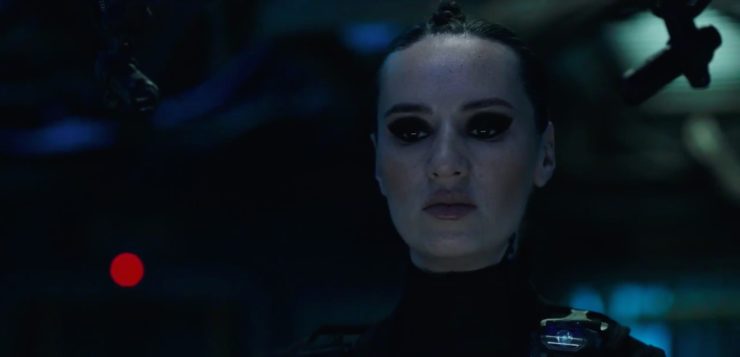
And then there’s Earth, cold, shattered, and breaking up in more ways than one. Amos gets the thesis statement when he explains his theory on tribes—that when things are going well, people can exist in larger groups, but when things go south those groups get smaller and smaller, until (though he doesn’t come right out and say it) every last person is on their own.
Amos is on familiar ground. He knows how to survive, and he knows how to keep Clarissa alive. Looking out for her gives him purpose, and allows him to think only about what needs doing—up until the point where Peaches starts having questions about goodness and monsters and being afraid.
I love the conversation Clarissa and Amos have on the road, the natural way it underlines the differences between these two unlikely companions. Amos has never been on a field trip. Amos can’t imagine having so much money that you give some away without getting anything in return. (Amos probably also can’t imagine liking trees that much.) Clarissa is oblivious to the privilege of her upbringing, to the references she assumes everyone knows (Schrödinger’s parent!). Amid all of that difference, Amos still offers up something about himself: that he had someone who tried to take care of him. He resists Clarissa’s idea that his caretaker must have been a good person, saying, “There are ways that you can live a good life without being a good person.”
There’s such hope in Clarissa’s face when she replies, “I like that.”
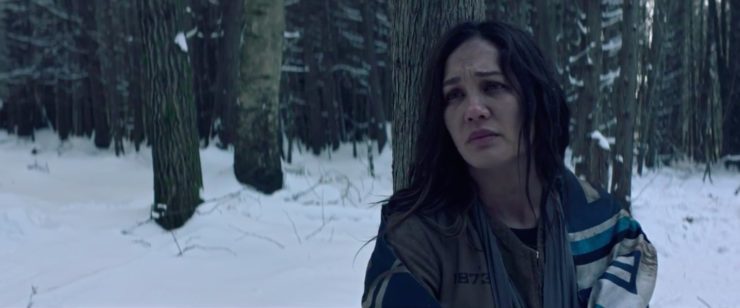
I’m still thinking about their last conversation about monsters and fear. (And about how both their big conversations this week take place while he’s looking out for her physical well-being.) Clarissa’s prayer is what she needs to believe, but the concept is flawed, and I think Amos knows that: plenty of monsters are deeply afraid. He’s been afraid, though few people have seen him display fear. Still, her questions rattle him. (Wes Chatham is so good at that contained but clear moment of consideration.) I don’t think Amos expected Clarissa to be a person who’d express the doubts she has here, if he expected anything in particular of her at all.
If Drummer is one opposite to Marco—a different version of what Belter leadership might be—Amos is another. The two men both use violence to achieve the ends they view as necessary. But while Amos chooses to have companions who will remind him that there are other ways, Marco nearly gets in a fight when someone suggests mercy. Their purposes are deeply different: Where Amos is practical, Marco is prideful. He wants power.
Amos just wants to get back to his crew.
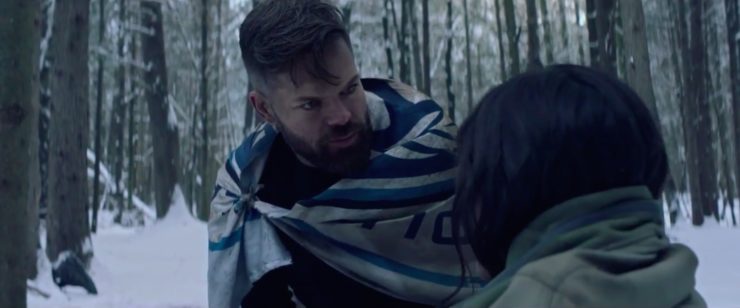
“Tribes” is a pause, a breath, a moment for the characters to try to reset and stabilize. The Expanse excels at these episodes, at balancing massive action sequences and drastic moments of change with the grounded, fraught experiences of each individual caught up in the churn. Holden’s loneliness, Avasarala’s grief (and the way she puts her jewelry back on!), Clarissa’s post-mod-use crash—they’re all palpable and real and familiar.
Those slower moments don’t just come after the threat is gone, or the war over. They land between battles, or in unexpected lulls, or in a break on the side of the road where for just a minute, two people can let their guard down. There is no clearly delineated after. There’s only what’s next.
Somehow, right now, I find some comfort in that.
FLOTSAM AND JETSAM
- It’s super interesting that this episode made it explicit that Marco did know that Naomi was trying to kill him. It wasn’t clear, in the moment, if Filip just dragged her off because she was on the bridge, or if he and Marco were aware of her intentions.
- The moment when Holden looks around his ship and it’s full of people who are not his crew is an elegant reminder that even though he’s home, he’s on his own. Also: Naomi’s message came from the Chetzemoka. Did he have that info before—the name of the ship? Surely he can use that to track her down.
- What is Marco plotting with his little ship display? Intercepting the Roci? His explanation about how the Belt will soon have its own agricultural sources is very intriguing and a rare moment of practical concerns, and also suggests his reach is even greater than we know. Also, interestingly, no one says anything about Earth’s own food supply, which seems likely to have been affected by the destruction.
- Bobbie Draper in a mech suit doing a Captain America to keep herself and Alex together was RAD.
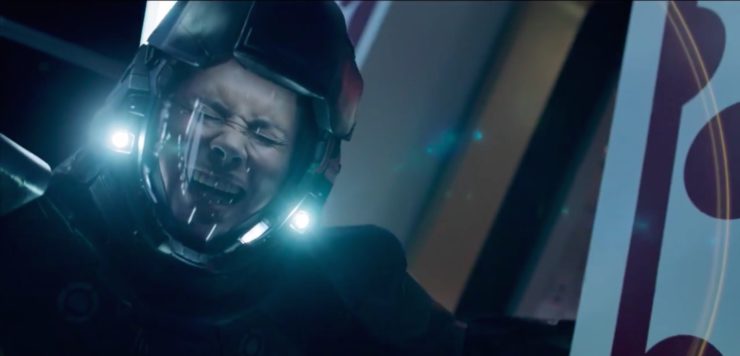
JUST A FEW BOOK NOTES
I’m not very focused on book-to-screen changes this season, partly because of how the show is mashing up two books (which makes drilling down to details less relevant or satisfying), and partly because everything is just right. (Though I did imagine the prepper survivalist guy as the rich kind with a shiny bunker full of new toys, rather than this scrappy, garage-living fellow.) I don’t remember Amos and Clarissa’s road trip being quite so nuanced, but I also was so caught up in the tension that the more subtle details may have faded from memory.
Mostly, I’m incredibly interested to see how Drummer’s storyline plays out in relation to Michio Pa’s story; it has the potential to be one of the most satisfying parts of this season, which is saying a lot. Combining characters into Drummer really allows her to be the Belter counterpoint to Marco: someone who went her own way, didn’t seek power, but has the skill and reputation to stand against him, especially now that two out of the three older leaders are gone. What Anderson Dawes makes of her at this point, I’m not at all certain.
Molly Templeton lives and writes in Oregon, and spends as much time as possible in the woods. You can also find her on Twitter.










